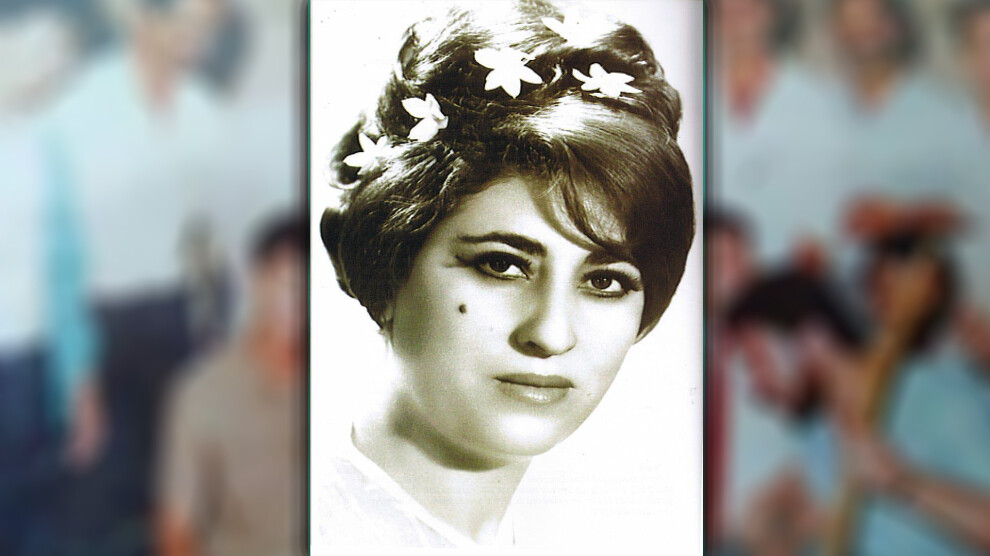Ayşe Şan: Kurdish singer created herself through her songs reflecting her experiences
Ayşe Şan was a Kurdish singer, who created herself through her songs reflecting her experiences and by fighting the patriarchal system.

News Center- Kurdish singer Ayşe Şan spent her life struggling against gender stereotyping. She followed her dreams despite the patriarchal mindset seeing “the voices of women” as shameful, sinful and forbidden. Her songs were also the painful and sorrowful stories of other women in the geography where she was born.
Ayşe Şan was born in Amed in 1938. Her mother Haciye was from Erzurum and her father was a dengbêj (Traditional Kurdish singer singing storytellers). Many dengbêjs gathered at their home and sang Kurdish traditional songs. Ayşe Şan listened to them and then began to sing.
When she was nine, she lost her father. She wanted to sing to keep her father’s memory alive; however, men saying, “Women could not sing in public” did not allow her to sing. When she sang during meetings of women, women noticed the exceptional quality of her voice. But she was not allowed to sing when men were around. In order to stop her from singing, she was forced into a marriage.
Although she did not want to get married, she was forced into a marriage with a man named Şevket in 1953, when she was 15. She began to live in the Derik district of Mardin province and gave birth to her daughter. Since she was unhappy, she wanted to get a divorce; however, her family, relatives and tribe members did not allow her. One day, she returned to Amed with her daughter and began to work at a tailor’s workshop. Her family, relatives and tribe members reacted to her for ending her marriage and wanting to continue her career in music.
Ayşe Şan had three sisters and a brother. Ayşe Şan could not return to her family house in Amed because of her brother’s threats. She stayed at the home of her friend Kadriye in Amed. Ayşe Şan and Kadriye recorded a song. A record company offered Ayşe Şan and Kadriye to make a record; however, Kadriye was not allowed to sing by her husband. Ayşe Şan moved to Antep to escape the rumors about her. She began to work in a tea house and recording songs for a local radio station in Antep. Since singing in Kurdish was forbidden, she recorded Turkish songs for the local radio station. She appeared in concerts and sang both Kurdish and Turkish songs.
‘I should keep my father’s memory alive’
In an interview with a local radio station in Iraq, Ayşe Şan said:
“My father was a very good dengbêj. He had a very good voice. When my father sang, his voice echoed everywhere; his voice could even be heard from another village. When my father passed away, I missed his voice and himself. When dengbêj (s) sang the songs of my father, I felt very sad and cried because they sang them very badly. That time, I told myself that ‘I should keep my father’s memory alive’.”
She did not allow the rumors about her to affect her
When her family members and tribe members learned that Ayşe Şan was recording songs for a local radio station in Antep, they caused rumors about her to spread more. Ayşe Şan was only supported by her mother. Ayşe Şan made great efforts to save her daughter from the rumors.
Her song ‘Ez Xezalim’ had a huge popular success
Ayşe Şan recorded songs for the local radio station in Antep for two years. In 1963, she moved to Istanbul with her daughter and recorded her first album in Kurdish. Her song “Ez Xezalim” (English: I am a gazelle) had a huge success. In Istanbul, she was detained for singing Kurdish songs and then released. Despite that, she kept singing in Kurdish. Some of her well-known songs are “Lé Lé Xifşé”, “Lorke”, “Siverek Yollarında” and “Gurbette”.
She emigrated to Germany
Due to pressure on her for singing in Kurdish, Ayşe Şan emigrated to Germany in 1976. When she was in Germany, she recorded many songs and became famous. While in Germany, her 18-month-old daughter Shahnaz died. Ayşe Şan wrote the song “Qederê” in memory of her daughter.
She began to record songs for Radio Baghdad
In 1978, Ayşe Şan moved to Iraq and began to record songs for Radio Baghdad. She gave concerts in the main cities of Southern Kurdistan with other Kurdish singers like Mihamed Arif Cizrawî, Isa Berwarî and Gulbihar. In 1979, she returned to Turkey and lived in Izmir. She worked in a local post office in Izmir. Due to the threats of her relatives, she never returned to Amed, her hometown. She was not allowed to attend her mother’s funeral. Her song “Xerîbim Dayê” is about her mother's death.
Ayşe Şan died on December 18, 1996 due to cancer. Despite her wishes to be buried in Amed, she was buried in Izmir. Her songs are still listened to by millions. She was a Kurdish singer, who created herself through her songs reflecting her experiences.
